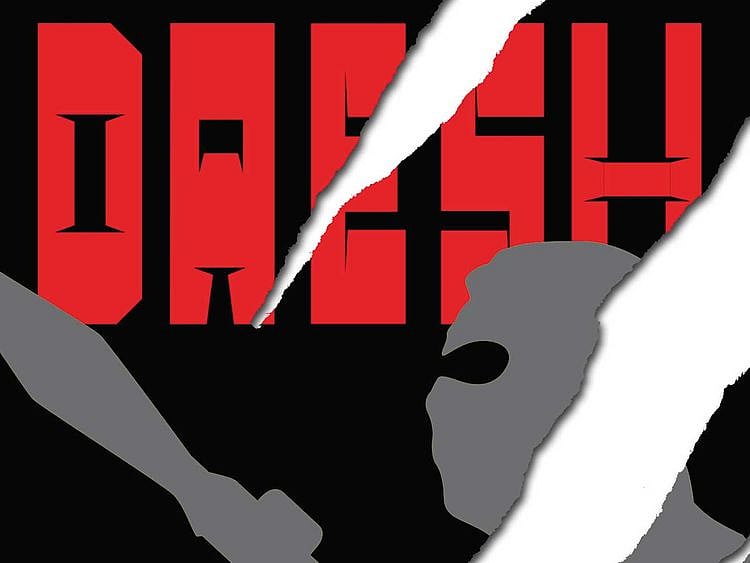Will we ever, any time real soon be able to wash our hands of the Daesh and just go about our business, now that the group has effectively been dead and buried in our region for close to two years? Not by a long shot.
The extradition from Iraq to the US last week of two Daesh desperados, accused of beheading American journalists and aid workers on camera six years earlier, came as a jolt, for it reminded us — at a time when we thought we had banished the memory of the group’s savageries from our collective conscience — that the Daesh saga had indeed been for real. Those actors in it were not, after all, characters we had been watching in a horror movie scripted by Marquis de Sade, the 19th century French sicko whose perversions gave rise to the term “sadism”.
At their arraignment last Friday, where as indigents they were assigned public defendants, the two bearded, scruffy-looking suspects, Alexanda Kotey, who was born in London, and El Shafee Elsheikh, who had moved there from Sudan with his family as a child, were bewildered but, one suspects, also relieved, for had they remained in Iraq, they knew that they most likely would’ve been given a summary trial and executed within the week — no questions asked, no explanations given.
Alas, now and for months to come, as the two get to have their day in court, memories of those Daesh savageries, like flashbacks, will be reignited in our minds, much in the manner that fraught memories are reignited in the minds of post-traumatic stress disorder victims.
Also Read
I am a Palestinian living and reliving haunting memoriesLebanon is teetering close to the edgeHow relevant is the United Nations at 75?UAE-Israel deal: History has its own dynamicIn the five short years it was able to strut with arrogant swagger across the Levant, where in its heyday it held significant swaths of urban, rural and desert territory that stretched across a third of Syria in the east and close to half of Iraq in the northwest — in all territory reportedly the size of Britain, that contained an estimated 12 million people — Daesh, staked for itself a legitimate claim as one of the most unhinged, the most nihilistic and the most cut-throat movements in Arab history.
No one had seen anything like it since the Hashashin — the Assassins, in Western history books — who lived in fortified hilltop castles in Syria and the mountains of Persia between 1090 and 1275 and for decades terrorised the Middle East by stealthily murdering, usually in knife-wielding teams, Muslim as well as Christian leaders considered enemies of their homeland. Not since that time, that is, had anyone seen anything resembling the campaign of terror that Daesh had launched in our region, which included genocide on an unprecedented scale, wanton destruction of cultural heritage sites, the kidnapping and rape of ethnic minorities and, well, yes, videotaped beheadings of innocent journalists and workers.
Germ of preordained failure
But, at the end of the day, given its bleak vision, one that effectively sought to restore in man what there had been of beast, Daesh carried within itself the germ of preordained failure, for by 2018 it would be curtains for the group. Its hubris, you see, would finally do it in. (To be sure, its artless mendacities had not helped either. The group, you may recall, claimed Stephen Paddock, the 64-year-old perpetrator of the 2017 Las Vegas massacre, as one of its own militants!)
By December that year, after months of enduring more than 12,000 air strikes by US bombers, Daesh had lost its entire territory, its foot-soldiers were killed, captured or on the run, with remnants of the latter holed up in the small town of Baghuz, which sits on the western bank of the Euphrates River, near the Iraqi-Syrian border, where three months later, mercilessly assaulted on the ground and bombed from the air, they were left for dead or made to raise the white flag.
Kitschy vision of liberation
When historians chronicle the rise and fall of civilisations, polities and movements, they need a beginning and an end. While the ignominious end of Daesh took place in a dusty, backwater town in rural Syria in March 2019, its cocksure beginning had taken place in June 2014, when its leader, Abu Bakr Al-Baghdadi — who for years had been obsessed with marrying his kitschy vision of liberation to the lofty glories of our Islamic past — declared, from the pulpit of a mosque in Mosul, Iraq, the establishment of a worldwide caliphate (which elicited ridicule from Muslim theologians), whose caliphniks would, in time, “march on Rome” (which elicited guffaws all around).
Everyone at the time thought it was all a spoof. Of course, we were to learn later, it was anything but. Now it’s going to take two jerks (what else would you call them?) extradited from Iraq to the US, whose case will take months to adjudicate, to remind us, once again, that Daesh odyssey is truly an epic stain on our modern history, a stain that no proverbial detergent will in the near future rinse from our collective conscience. Damn the beast.
— Fawaz Turki is a journalist, lecturer and author based in Washington. He is the author of The Disinherited: Journal of a Palestinian Exile
Sign up for the Daily Briefing
Get the latest news and updates straight to your inbox
Network Links
GN StoreDownload our app
© Al Nisr Publishing LLC 2026. All rights reserved.
